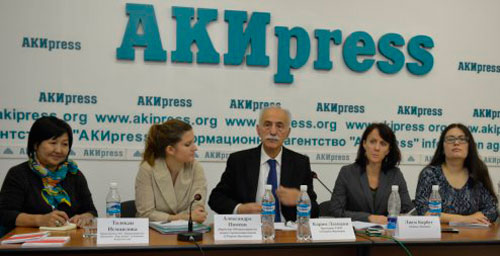Pivotal moment for democracy in Kyrgyzstan: defenders facing increasing pressure
(Bishkek) Several laws, currently under discussion in Kyrgyzstan’s Parliament, could dramatically restrain Kyrgyz civil society activities if adopted, the Observatory (FIDH-OMCT) warned today. The Observatory also denounced the increase, over the past few years, of the pressure against civil society: illegal searches of NGO offices, surveillance and intimidation by intelligence services, threat to (mis)use criminal provision on fighting extremism, smear campaigns in the media, etc. These concerns were expressed during a press conference in Bishkek, which followed a week-long investigative and advocacy mission in the country.
The Observatory delegation met with the Deputy Prime Minister, the First Deputy Minister of the Ministry of Internal Affairs, the Deputy of the Ombudsman of Kyrgyz Republic, the Ombudsman of Jalal-Abad , the Ombudsman of Osh, the Deputy Prosecutor General of the Republic, the Head of the Inter-Ethnic and Religious Affairs under the Presidency, as well as civil society representatives in Bishkek, Osh and Jalal-Abad.
The delegation urged them to protect the space of human rights defenders and to oppose the passing of several laws, notably one imposing the stigmatising label of « foreign agents » for NGOs receiving foreign funding and one criminalising ‘promotion’ of the equality of rights of LGBTI persons.
“FIDH and OMCT fear that the passing of these laws will not only silence human rights defenders but also put a fatal end to the construction of a democratic system in Kyrgyzstan”, declared Karim Lahidji, FIDH president, who was heading the mission.
For many years, Kyrgyz civil society has been considered one of the strongest in Central Asia. But, recently, while the country has joined the Eurasian Customs Union, Russia has also traded bad practices with the introduction of Russian like draft laws that endanger the freedoms of association, expression and peaceful assembly.
“Despite the fact that Kyrgyz authorities have been developing human rights institutions in recent years, most of them, in keeping with Soviet tradition, remain a facade and are not functioning effectively”, declared Tatiana Glushkova, lawyer with the Human Rights Centre “Memorial”.
One day before the end of the mission, the authorities have failed to issue a permission to visit Uzbek minority human rights defender Mr. Azimjan Askarov, sentenced to life in prison in 2010, following the ethnic clashes in southern Kyrgyzstan.
“Azimjan Askarov is paying the highest price of a subtly increasing repressive policy. The Kyrgyz human rights community remains dynamic but suffers following the multiplication of acts of intimidation”, declared Alexandra Pomeon, FIDH Director of the Observatory for Protection of Human Rights Defenders, who was also part of the mission.
A mission report will be issued in the coming months and will present detailed conclusions and recommendations to the Government of Kyrgyzstan, non-State actors, the United Nations, the European Union and foreign embassies in Kyrgyzstan.


















